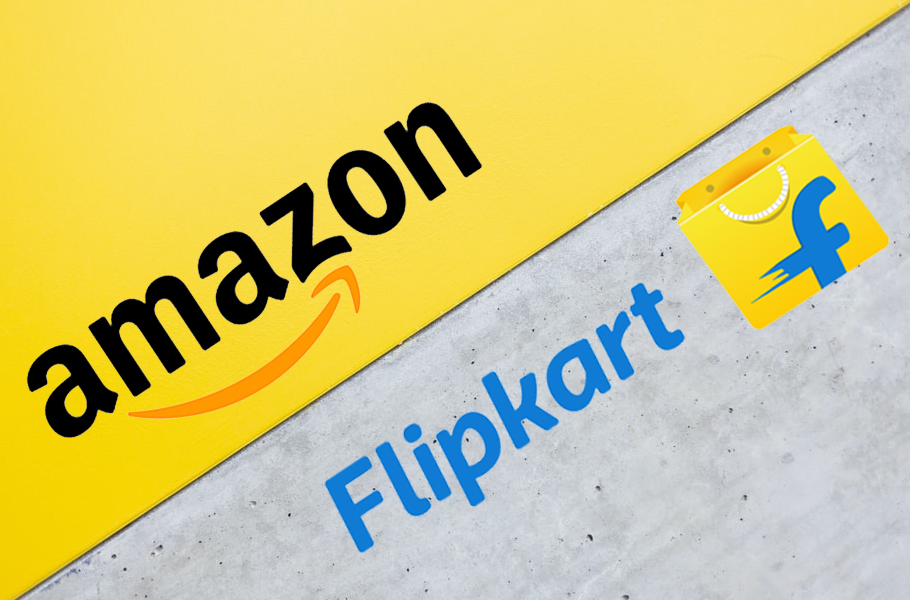
COVID lockdown helps Flipkart, Amazon expand business across India
Flipkart and Amazon's recent announcement to open offices in newer locations and warehouses a.k.a. fulfilment centres across the country give an indication of the opportunities that the pandemic has brought in for the two big giants of the e-commerce industry.

Flipkart and Amazon’s recent announcement to open offices in newer locations and warehouses a.k.a. fulfilment centres across the country gives an indication of the opportunities that the pandemic has brought in for the two giants of the e-commerce industry.
Last week, Flipkart Wholesale, the digital B2B marketplace of the company, announced that it plans to open 12 more branches in cities across India while Amazon India said it is setting up five new centres to sort packages which will improve the speed of deliveries ahead of the festive season.
The Indian e-commerce story is growing in leaps and bounds with the industry expected to record a 40 per cent growth in 2020 compared with the previous year as more consumers line up to buy online. The $27-billion market, measured in terms of the gross merchandise value (GMV), grew 23 per cent in 2019 and by the end of the calendar year, the GMV is expected to grow to $38 billion.
In spite of the Centre’s marked reluctance to let these e-commerce players have a larger play in the domestic market, the pandemic has left the government no choice but to allow them to continue with their businesses.
The bill to regulate the e-commerce industry, which has been in the works for a long time, may now take much longer to come out. The secretary, department for the promotion of industry and internal trade, which had in an interview with news agency IANS early this year, had said the final policy will be out during the year but it may now get delayed further.
The draft bill in circulation with several amendments imposes restrictions on various activities of the e-commerce players. These include barring online marketplaces with foreign investments from selling products of the companies where they held stakes controlled inventory and banned exclusive marketing arrangement. This was part of the FDI rules in e-commerce brought out in December 2018. The draft policy aims to provide a regulatory framework to ensure fair competition, consumer protection and handling of data.
However, the current draft e-commerce policy has widened the scope and includes buying, selling, marketing, distribution or providing access to goods. The 15-page draft makes it clear that if a certain platform collects non-personal data of consumers, the entity should disclose the reasons for such an act including its usage. It also seeks to restrict computing facilities like data centres and server farms within the country.
The draft policy also has set guidelines to protect consumers. It expects e-commerce players to come out with timelines which should be displayed on the website to redress their complaints. To ensure fair play, the e-commerce players will also need to provide all options of products and services available to the consumers without favouring any specific product, supplier or group.
Related news: Flipkart Group to launch Wholesale, acquires Walmart India Private Limited
However, restrictions may not be the only bugbear for foreign e-commerce players. The competition will soon come from Reliance Retail which as of now is way behind the two big giants but might through several strategic investments end up as a potent force sooner than later. Last week, it received investment from the US private equity (PE) firm Silver Lake worth Rs 7,500 crore for a 1.75 per cent stake, valuing the company at Rs 4.2 trillion.
The parent, Reliance has, in fact, given the option to investors in Jio Platforms to fund its retail venture to unlock its value after it acquired the Future Group’s retail business for Rs 24,713 crore. According to various reports, it is willing to shed as much as 25 per cent to 3 per cent to foreign investors. If a mere 2 per cent can fetch as much as Rs 7,500 crore from an investor, 25-26 per cent can fetch nearly Rs 1 lakh crore.
While it could open up a huge opportunity for sellers, vendors and several other businesses, it will also mean tougher competition for the existing players such as Flipkart, Amazon.in and Snapdeal. The rating agency, Fitch Solutions summed it pretty well when in a recent report, it said international e-commerce players while facing increasing risk due to policy changes, the bigger challenge will come from Reliance Retail.
It also said that the draft regulations can prove to be worrisome for the foreign e-commerce players. “Under the new policy, international e-commerce companies in India would be banned from influencing pricing, employing unfair promotional activities, as well as misrepresenting the quality or features of their product offering,” Fitch Solutions said.
It is, of course, a reality that the e-commerce industry will only thrive though it remains to be seen how Reliance Retail which has had no experience in online retailing will be able to match up to the giants like Flipkart and Amazon. The next few years will show who will be ahead of the others and who will end up burning up the most cash.


